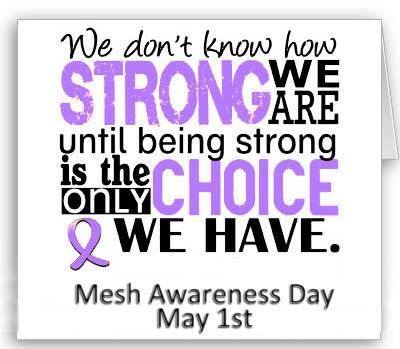
Monday 1st May is International Mesh Awareness Day, the start of Mesh Awareness month. It highlights the complications suffered by women who have had mesh implants to treat stress urinary incontinence and pelvic organ prolapse.
You may have seen a recent episode on The Project which highlighted the little known reality that when a urogynecological mesh implant goes wrong, it can go badly wrong, with life-changing effects for the women affected. It has taken the recent media activity on the topic for some women to recognise the symptoms in themselves. And despite what Waleed Ally stated in the final moments of the Project episode on the topic, complications can occur quite some time after implanting, and only partial removal options exist for women.
The use of mesh is now the subject of a federal Senate Inquiry, which is taking submissions until the 31st May 2017. The Inquiry’s title “Number of women in Australia who have had transvaginal mesh implants and related matters” highlights that we simply don’t know how many women have had these implants, and how many of them have suffered complications.
Health Issues Centre Victoria hosted a Facebook Page “Understanding pelvic mesh implants and impacts on women in Australia”. This page is part of a united response by health consumers councils across Australia to ensure women’s voices are at the heart of the Senate Inquiry Submission. It links to an anonymous survey where women and their families are able to provide feedback to inform the joint Submission. The page will be active until the Inquiry Submission deadline of 31st May 2017.
Pictured: Caz Chisholm holding both her awards
Here in WA, on Thursday 27th April, the Health Consumers’ Council announced our Health Consumer Excellence Awards. The winner of the Health Consumer Award, and the Rosemary Caithness Award to acknowledge outstanding service to health consumers was the same person – Caz Chisholm. Caz is one of the founders of the Australian Pelvic Mesh Support Group, a Facebook page which has grown from 39 members two years ago to just under 600 members in the last week, after the airing of the Project episode. She has spent significant time and energy raising awareness for women about the issue and providing essential peer support. She was also directly responsible for ensuring that the Senate Inquiry was successfully advocated for by Senator Hinch in the first place.
For women and families affected by pelvic mesh, we urge you to have your say to ensure the consumer voice is central to the Submission. Check the Having A Say section lower down on this page for the links to the different ways to provide your feedback.
Please also note that the health consumers councils across Australia have developed a Consumer Information Sheet which appears below and is also available as a PDF. Please contact us on info@hconc.org.au or 9221 3422 if you have any comments or concerns.
Consumer information
For women who have had, or are considering having surgery to treat stress urinary incontinence and pelvic organ prolapse
If you have been diagnosed with pelvic organ prolapse or stress urinary incontinence, the likelihood is that you will be offered surgery once non-surgical options such as physiotherapy have been exhausted.
Surgery for these two conditions are usually involves a mesh insertion or implant. It might be called tape or a sling. It is all the same from a consumer perspective and these products are collectively known as mesh. The Therapeutic Goods Advisory Website has an updated list of complications associated with surgery using mesh. https://www.tga.gov.au/alert/urogynaecological-surgical-mesh-complications
Mesh implants have been offered to women since the late 1990s. The procedure is considered to be only partially reversible, and some women have travelled to America at their own expense to have mesh removed.
Before you consent to any surgical procedure, it is important to ask all the questions you need so you understand what you are consenting to. The Choosing Wisely campaign has created these questions to help you get started. http://www.choosingwisely.org.au/resources/consumers/5-questions-to-ask-your-doctor
1. Do I really need this test or procedure?
Tests may help you and your doctor or other healthcare provider determine the problem and the procedures that may help to treat it.
2. What are the risks?
Will there be side effects? What are the chances of getting results that aren’t accurate? Could that lead to more testing or another procedure?
3. Are there simpler, safer options?
Sometimes all you need to do is make lifestyle changes, such as eating healthier foods or exercising more. Another option to ask your doctor about is native tissue repair.
4. What happens if I don’t do anything?
Ask if your condition might get worse — or better — if you don’t have the test or procedure right away.
Stress urinary incontinence is not a life-threatening condition so consider carefully before undergoing any surgery. Do not consider surgery until all non-surgical options have been exhausted.
5. What are the costs?
Costs can be financial, emotional or a cost of your time. Where there is a cost to the community, is the cost reasonable or is there a cheaper alternative?
What help can I access?
- There is a Facebook group called the Australian Pelvic Mesh Support Group which can connect you with women who have had these procedures.
- Shine Lawyers is one of the firms that is currently undertaking class actions in relation to mesh
- Take this information sheet to your trusted health provider to discuss your current or future options
Having A Say
- Currently, there is a Senate Inquiry into the use of mesh. It is specifically looking to discover how many women have had a mesh implant, the impact of these implants, what the consent processes were, what removal options are available, what the Therapeutic Goods Administration role has been in it. Women are invited to make a submission to the senate inquiry with their story. http://www.aph.gov.au/Parliamentary_Business/Committees/Senate/Community_Affairs/MeshImplants
- As noted above, Health Issues Centre Victoria is hosting a Facebook Page Understanding pelvic mesh implants and impacts on women in Australia. This page is part of a united response by each state’s health consumers councils across Australia to ensure women’s voices are at the heart of the Senate. The page will be active until the Inquiry Submission deadline of 31st May 2017. Inquiry. https://www.facebook.com/UnderstandingPelvicMesh/
- The Therapeutic Goods Administration is seeking information from members of the public about complications. https://www.tga.gov.au/alert/urogynaecological-surgical-mesh-complications
- The Australian Commission into Safety and Quality in Healthcare is also undertaking work develop guidance for consumers, clinicians and health services on the use of transvaginal mesh products for the treatment of pelvic organ prolapse and stress urinary incontinence. https://www.safetyandquality.gov.au/our-work/transvaginal-mesh/
Complications associated with use of Pelvic Mesh
These are listed on Australia’s Therapeutic Goods Administration (TGA) website as follows: https://www.tga.gov.au/alert/urogynaecological-surgical-mesh-complications
|
|
Author: Pip Brennan, Executive Director of the Health Consumers’ Council. Consumer Member on the Australian Commission on Safety and Quality in Health Services Reference Committee.





